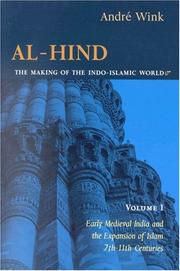| Listing 1 - 2 of 2 |
Sort by
|

ISBN: 9780391041738 9780391041745 9789004135611 9004095098 9004135618 9789004483019 9789004483002 1423714202 9786610465163 1280465166 904740274X 9789004095090 9781423714200 Year: 2004 Publisher: Leiden : BRILL,
Abstract | Keywords | Export | Availability | Bookmark
 Loading...
Loading...Choose an application
- Reference Manager
- EndNote
- RefWorks (Direct export to RefWorks)
Focuses attention on the role of geography and, more specifically, on the interplay of nomadic, settled and maritime societies. In doing so, it presents a picture of the world of India and the Indian Ocean on the eve of the Portuguese discovery of the sea route.
Indian Ocean Region --- Islam --- History of Asia --- anno 1400-1499 --- anno 1300-1399 --- South Asia --- Muslims --- History --- India --- Muslims - India - History --- India - History - 1000-1765 --- Indian Ocean Region - History --- India - History - 1000-1765. --- Muslims. --- Indian Ocean Rim countries --- History. --- Musulmans --- Inde --- Empire islamique --- Indien, Océan (région) --- Histoire --- 1000-1526 --- 661-750 --- 750-1258
Book
ISBN: 1614511853 1283629240 9786613941695 9781614511854 9781614512462 1614512469 9781283629249 6613941697 1614511861 Year: 2012 Publisher: Boston ; Berlin : De Gruyter,
Abstract | Keywords | Export | Availability | Bookmark
 Loading...
Loading...Choose an application
- Reference Manager
- EndNote
- RefWorks (Direct export to RefWorks)
This book explores the religious identity of the indigenous Gujjars living in Rajaji National Park (RNP), Uttarakhand, India. In the broader context of forest conservation discourse, steps taken by the local government to relocate the Gujjars outside RNP have been crucial in their choice to associate with NGOs and Deobandi Muslims. These intersecting associations constitute the context of their transitioning religious identity.The book presents a rich account of the actual process of Islamization through the collaborative agency of Deobandi madrasas and Tablighi Jama'at. Based on documents and interviews collected over four years, it constructs a particular case of Deobandi reform and also balances this with a layered description of the Gujjar responses. It argues that in their association with the Deobandis, the Gujjars internalized the normative dimensions of beliefs and practices but not at the expense of their traditional Hindu-folk culture. This capacity for adaptation bodes well for the Gujjars, but their proper integration with wider society seems assured only in association with the Deobandis. Consequently this research also points toward the role of Islam in integrating marginal groups in the wider context of society in South Asia.
Islam --- Muslims --- Deoband School (Islam) --- Bakrawallah (Indic people) --- Mohammedans --- Moors (People) --- Moslems --- Muhammadans --- Musalmans --- Mussalmans --- Mussulmans --- Mussulmen --- Religious adherents --- Mohammedanism --- Muhammadanism --- Muslimism --- Mussulmanism --- Religions --- Bakkarwal (Indic people) --- Gujjar Bakarwal (Indic people) --- Ethnology --- Islamic Deoband School --- Muslims in India --- Doctrines --- Islam - South Asia --- Islam - India --- Muslims - South Asia --- Muslims - India --- Deoband. --- Islamization. --- Rajaji National Park. --- Tablighi Jama'at. --- Van Gujjards.
| Listing 1 - 2 of 2 |
Sort by
|

 Search
Search Feedback
Feedback About UniCat
About UniCat  Help
Help News
News